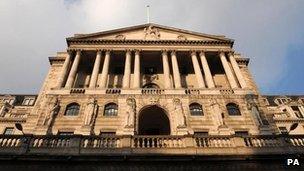Bank of England's MPC uses no new stimulus measures
- Published

The Bank of England's Monetary Policy Committee (MPC) has decided at its monthly meeting not to introduce any new stimulus measures.
It has kept interest rates at their record low of 0.5% and not to raise the amount of quantitative easing (QE) from the current level of £375bn.
Under QE the central bank creates money and uses it to buy mainly government bonds to stimulate the economy.
Some analysts expect the amount of QE to be increased next month.
The Bank expects to have finished spending the latest tranche of £50bn of QE, which was approved in July, by 1 November.
"Looking ahead to November's meeting, we think that the Committee is likely to favour further asset purchases," said Anna Leach, head of economic analysis at employers' organisation the CBI.
"While there have been a few positive signs in recent data, underlying conditions remain relatively flat. Meanwhile, uncertainty around the international backdrop is likely to build further through the autumn, keeping confidence in check."
Shortly after the Bank's decision was announced, the European Central Bank (ECB) also held its benchmark interest rate, at the record low of 0.75%.
Olympic boost
There are two other key pieces of information coming up, which MPC members may be waiting to see before deciding to expand the QE programme again.
On 25 October, the first estimate of economic growth in the three months from July to September will be released by the Office for National Statistics (ONS).
It is expected to show the UK economy returned to growth - helped by a boost from the Olympics - having contracted for the previous three quarters.
Also, although the Bank of England's next quarterly inflation report will not be published until 14 November, it will be available to MPC members when they meet the previous week.
Minutes of the MPC meeting in September showed some members thought more QE was "more likely than not to be needed in due course", while one member thought there was a "good case" for more QE immediately.
The minutes from October's meeting of the MPC will be published on 17 October.
On Wednesday, Business Secretary Vince Cable refused to be drawn on when the economy might return to growth.
"We are in a very deep crisis, quite unlike any we have experienced before because it's centred on the collapse of the banking system," he told the BBC.
"Projecting and predicting how we get out of this crisis is very difficult indeed."
'Near stagnation'
Surveys earlier this week have suggested that the much-anticipated growth expected for the third quarter may be less robust than had been hoped.
The Markit CIPS purchasing managers' index (PMI) found that the service sector had grown in September, but at a slower rate than it had in August.
Meanwhile, the PMI reports for manufacturing and construction found that they had both contracted in the month.
Markit, which produces the reports, said they suggested that the economy had been "near stagnation" between July and September.
But the British Chambers of Commerce was more upbeat, saying its survey had suggested growth of about 0.5% in the third quarter.